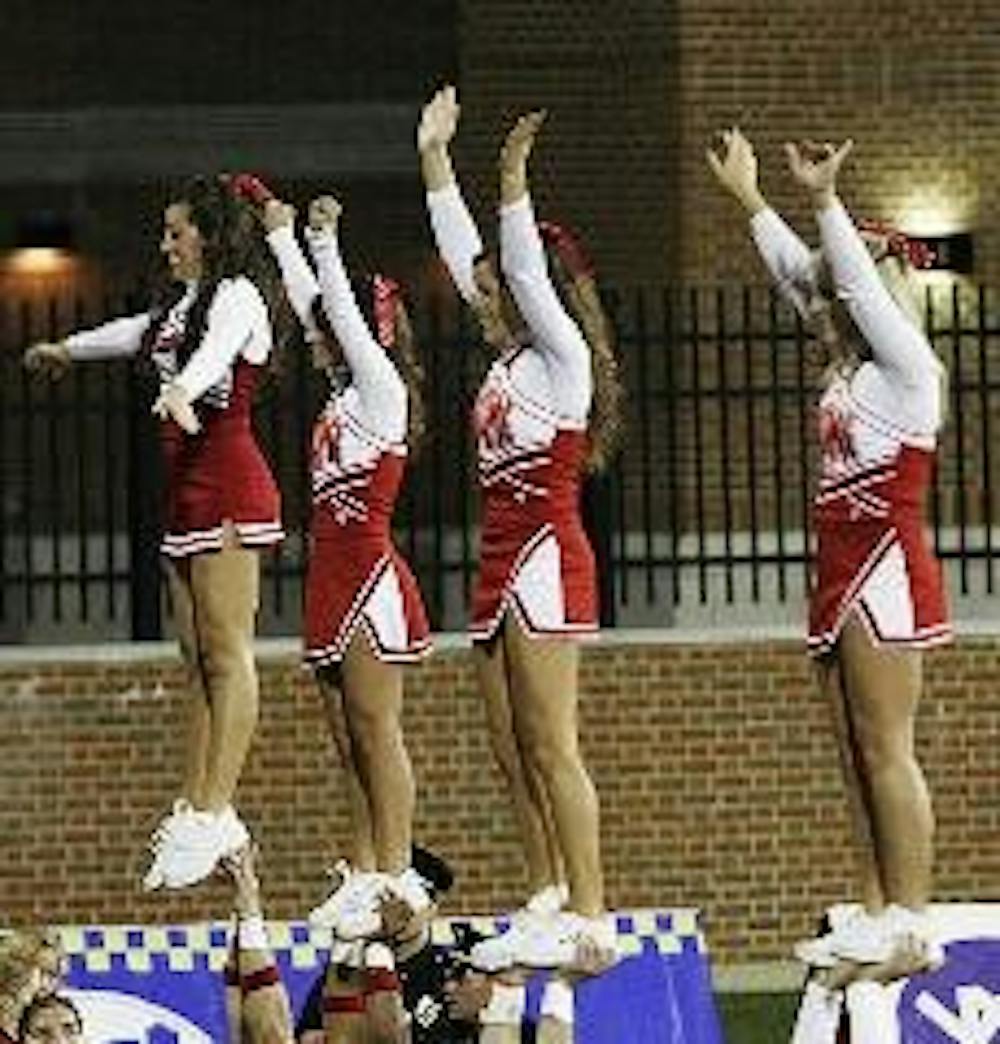
The Miami cheerleading squad performs a routine at Sunday's homecoming game against Northern Illinois University. (Michael Pickering)
Miami University registrar David Sauter has had a lot on his plate since taking over the post this past January, but one of the most prominent issues he has been faced with just recently has been dealing with the criteria for priority course registration - specifically regarding members of the Miami cheerleading squad.
While student-athletes are granted priority registration for academic courses so that their schedules are free for practices and game travel on Fridays, cheerleaders must register for the classes with the rest of the student body, a policy that Sauter said he is looking forward to exploring.
"We try to look at people with predetermined conflicts and commitments to the university, for example, when evaluating who gets to register early for classes," Sauter said. "Different groups might make requests and we have to look at those."
The cheerleading squad must operate in accordance with safety rules put in place by the National Collegiate Athletic Association (NCAA), said cheerleading coach Cindi McDaniel, and one of the requirements is that a trainer be present at practices for safety concerns to assist with routines. This requirement might pose problems, McDaniel said, since the cheerleaders often practice at night and most trainers find it difficult to accommodate those practice times.
"It's ... an impossibility to try and get them where they can all work together," McDaniel said. "If half of your team is missing because of different schedules, you can't do certain things."
Senior Sara Chaney, a member of the cheerleading squad, said the absence of priority registration has made practice and travel schedules more difficult for the team, which is why she is excited about a new opportunity to petition the university for a change in policy.
"We've been trying to get this for a few years now," Chaney said. "It's gotten as high as the provost's office this time, so we'll see what happens."
Brad Bates, Miami's director of intercollegiate athletics, said that the difference between student-athletes and cheerleaders that has accounted for the discrepancy in registration privileges lies heavily in the fact that student-athletes are governed by certain academic requirements that cheerleaders are not governed by.
"(Student-athletes) have to meet certain academic thresholds, and if they don't, they are declared ineligible," Bates said.
Sauter said the NCAA requires student athletes to make considerable progress each semester within their declared majors. Sauter said that a university task force known as the Group of Four, which convened in 2004, recommended priority registration for student-athletes for the purpose of satisfying these NCAA requirements.
Enjoy what you're reading?
Signup for our newsletter
Sauter said that another academic advising task force, which he is scheduled to chair, is currently being formed. He did not speculate on whether cheerleader priority registration would be a main concern.
Currently, Sauter said, about 1,800 students; including students studying abroad, student-athletes, honors students and disabled students; have priority registration, but the hope is that everyone gets a fair shake in the registration process.
"In an ideal world, the special populations will have their needs met and everything else will fall into place," Sauter said.
To ensure fairness in the registration process, Sauter said, the university constantly monitors the status of class openings to determine whether to open new sections, but special care is taken not to grant priority registration to so many students that the rest of the student population is left out in the cold.
McDaniel said that, while it is more difficult to accommodate schedules than it is for athletic teams, the athletic department has been helpful in making facilities available for practices as often as possible.
"(Priority registration) could be a recruiting tool as well," McDaniel said, "but there's the rest of the student population too. They need to get their classes as well."




